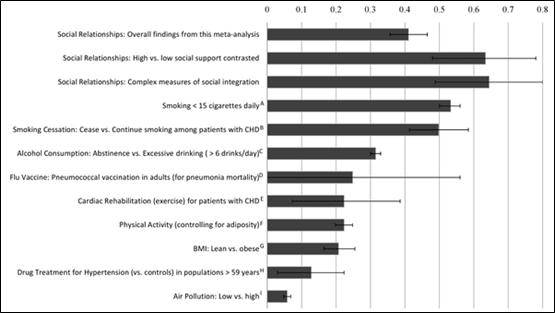Friends are a matter of life and death
- Published
- comments

We are such a cynical lot. When a Downing Street advisor points out that loneliness is probably more dangerous to our health in retirement than smoking, there are plenty who immediately assume that the advice is part of some dastardly statist plot to get pensioners out of their one-bed flats to sweat their final years away on a factory production line - see below for one example.
But might it be true? And if it is, should we take isolation as seriously as we do obesity or smoking in our health strategies?
The findings which inspired David Cameron's nudge unit come from a meta-analysis (analysing lots of different pieces of existing research) of 148 studies into the effects of social isolation on mortality conducted by academics at Brigham Young University and the University of North Carolina, external in the US.
The researchers were able to look at the lives of almost 309,000 people for an average of 7.5 years. (That is a seriously big sample.)
What emerged was that those with stronger social relationships had a 50% increased likelihood of survival than those who lived more solitary lives. (And that is a seriously powerful finding.)
The effect was consistent across a number of factors:
age
sex
health status
follow-up period
cause of death
This isn't research showing that pensioners are better off having friends - it suggests that we are all likely to enjoy health benefits if we have busy social lives.
No-one is suggesting it is wrong to live alone or enjoy one's own company. But human beings are social creatures and starved of contact we can, quite literally, die.
The conclusion to the US research makes the point that "many decades ago high mortality rates were observed among infants in custodial care (ie, orphanages), even when controlling for pre-existing health conditions and medical treatment".
It was then noticed that lack of human contact predicted mortality. "The medical profession was stunned to learn that infants would die without social interaction. This single finding, so simplistic in hindsight, was responsible for changes in practice and policy that markedly decreased mortality rates in custodial care settings."
Loneliness is bad for our health. Seriously bad. Doctors have known this for decades.

Friendship can make the heart grow stronger
An article in Science magazine in 1988 noted that "social relationships, or the relative lack thereof, constitute a major risk factor for health - rivalling the effect of well-established health risk factors such as cigarette smoking, blood pressure, blood lipids, obesity and physical activity".
The more recent research concludes that, if the impact of isolation is potentially so great on our health, we should do more to prevent it. "Medical care could recommend if not outright promote enhanced social connections; hospitals and clinics could involve patient support networks in implementing and monitoring treatment regimens and compliance, etc."
This table show the relationship between different aspects of lifestyle and mortality, comparing the odds of decreased mortality:

Company is much more important in reducing our risk of dying than losing weight, taking exercise or giving up booze or fags.
And do you know what? I would much rather Whitehall advisors were telling us about this stuff than trying to spin some new government wheeze.
I am not going to take up smoking or down a bottle of whisky a day because of the research. They are really bad for you too. But I might work a bit harder to be a good friend.